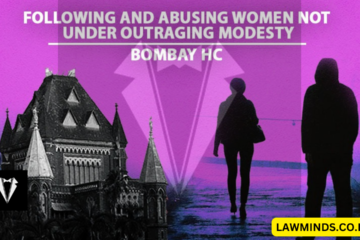Bombay: In a rather shocking ruling, the Bombay High Court held that following and abusing a woman will not attract the offence of Section 354 of the Indian Penal Code (Assault or criminal force to woman with intent to outrage her modesty). “As regards following and abusing P.W. 1, the said act cannot be said to be capable to shocking the sense of decency of a woman. The act may be annoying but definitely would not shock the sense of decency of a woman”, Justice Anil L Pansare observed. The case of the prosecution is that the accused/applicant had followed her couple of times and abused her. On the date of incident, while she was going to market, the applicant, who was following her on bicycle, pushed/shoved her. She got annoyed, however, she proceeded further. The applicant followed her and, therefore, she beat him.
After finding sufficient evidence, the courts below convicted the applicant for offense under Section 354. Aggrieved, he moved a revision application before the High Court. Relying on of Raju Pandurang Mahale Vs. State of Maharashtra and another, Additional Public Prosecutor stated that the essential ingredients of offence under Section 354 of the IPC. The first is that, the assault must be on a woman. The second is that, the accused must have used criminal force on her and the third is that, criminal force must have been used on the woman intending to outrage her modesty. In the case, the Supreme Court held that the ultimate test for ascertaining whether modesty has been outraged is to find out if the action of the offender could be perceived as capable of shocking the sense of decency of a woman. The High Court noted the ultimate act to be considered is the act of pushing/shoving her while riding bicycle.
According to the court, this is not an act capable of shocking the decency of a woman.“It is not the case of P.W. 1 that the applicant has touched her inappropriately or has given push at a specific part of her body which made her position embarrassing. The contact with the part of the body of P.W. 1 has been not stated by P.W. 1. In these circumstances, merely because the applicant has on bicycle given a push to P.W. 1, to my mind cannot be said to be an act which is capable of shocking the sense of decency of P.W. 1. The act may be offensive or annoying but cannot be said to be compromising the decency of a woman”.
The Court also noted that except for the victim’s evidence, there is nothing else bring home the guilt of the applicant. “As stated earlier, her evidence is not sufficient to attract ingredients of Section 354 of the IPC. The prosecution therefore failed to prove the case beyond reasonable doubt.” Stating this, the Court reversed the order of the court’s below, stating, “The Courts below have committed error in not applying the law to the admitted facts and thus rendered incorrect findings. The applicant has, therefore, made out a case.


